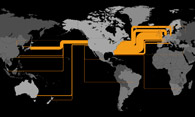The Internet has on many occasions been credited as a liberating force for LGBTs but is it really? Alex Au examines the two features of the Internet that may work against LGBTs in reducing visibility of LGBT individuals and audience fragmentation as Internet surfers pick and choose what they want to read online.

More recently, in many Asian cities, this has at last begun to be reversed. The steady trickle of coming out has raised the GLBT profile somewhat. At last the gay question is being seen as a legitimate social issue in some quarters. Yet, outside of the big cities, even this marginal degree of visibility has not yet arrived. Overall, we are still seen as extremely few, and of no consequence if political leaders ignored us. Try counting how many political parties (the significant ones, that is) in any Asian country would speak up for gay rights, and you'll get depressed.
Perhaps the Internet will eventually be a force to reckon with?
It's become almost banal to speak of the Internet as liberating. Indeed, through this medium, gay individuals have been able to find others of similar persuasion and to access information that helps them shape a more positive sense of self. Much of the contemporary gay consciousness in Asian countries owes a lot to digital technology.
Yet we may be misleading ourselves. The Internet can also set us back. We may not see this danger unless we are more precise whenever we speak of the "liberating" effect of the Internet. For sure, it has helped connect gay with gay, but how has it connected gay with straight? And since straights form the majority, unless it does so, how do we nail the gay issue onto the larger societal agenda?
Two features
There are two features of the Internet which may work against LGBTs. Far from increasing visibility, the Internet may in fact tend to reduce it.
Firstly, there is the temptation to stay anonymous and conceal true facets of oneself while online. Unlike coming out personally where one can try to set boundaries to as who gets to know and who doesn't, coming out online is an all-or-nothing affair. This is because it's hard to control who eventually stumbles upon one's blog (unless it is password-controlled, a situation that is outside this discussion). To say one is gay on one's blog is like telling the whole world. It's hardly any wonder if many gay bloggers do not disclose their sexual orientation.
So even when straight readers come upon gay individuals' blogs, they may never know they are engaging with a gay person. This is no different from the days when lesbians and gays routinely kept their sexual orientation to themselves.
Secondly, there is the effect of audience fragmentation. As we all know, Internet surfers pick and choose what they want to read online. For example, despite how open many gay online forums are, we almost never come across straight people participating in them. Surely, from time to time, heterosexuals stray into such forums, but they seem to leave just as quickly; they've got better things to do with their time.
As for blogging, even if LGBT bloggers declare themselves gay or write with a noticeable gay perspective, there is no reason for non-gay readers to stick around unless the subject matter is something that interests them too. Straight readers can hardly be expected to follow gay blogs regularly if all that those gay blogs talk about is personal or gay stuff. As a result, it shouldn't surprise us if most straight readers never come upon a gay blog.
As in previous years, the sustained invisibility leads to others being unable to appreciate GLBT community concerns. Unless a heterosexual person knows a few gay friends, or has taken a personal interest in the question of the gay minority, we shouldn't expect people to learn anything about the gay issue by being online. It will not occur to them that the gay community has priorities and concerns different from heterosexuals'.
A recent incident spoke volumes. Earlier this month, the Singapore Workers' Party Chairperson declared at a forum that her party would not bring up the matter of decriminalisation in Parliament. I wrote about it on my own website soon after. Among the comments I received was one by a gay reader who said he was not going to vote for them until the party changed their position. Immediately after, another person, probably straight, added his comment in effect asking him, why was this issue such a high priority for him? What's so difficult about voting for the party even if the party didn't support gay rights?
Now, of course, there are homosexual individuals too who do go around believing that gay rights are not needed at all (but don't get me started on them). I shall take it that the majority of LGBTs consider it important for their countries to address their concerns about discrimination, legal, social or in any other domain. Yet, there are surely huge numbers of heterosexuals out there who cannot grasp why we are "so obsessed" by such things.
This gulf in perception has not been closed. We would be too sanguine to think that the Internet revolution alone will do anything to close that gap. Left alone, people will continue to read what they want to read and to believe what they want to believe. To make a difference, the various digital platforms have to be consciously used to reach out to straight people in order to remind them of our presence and to change perspectives. Otherwise this "liberating" technology will only free us to form bigger ghettoes.
Alex Au has been a gay activist for over 10 years and is the co-founder of gay advocacy group People Like Us. Alex is also the author of the well-known Yawning Bread web site.
